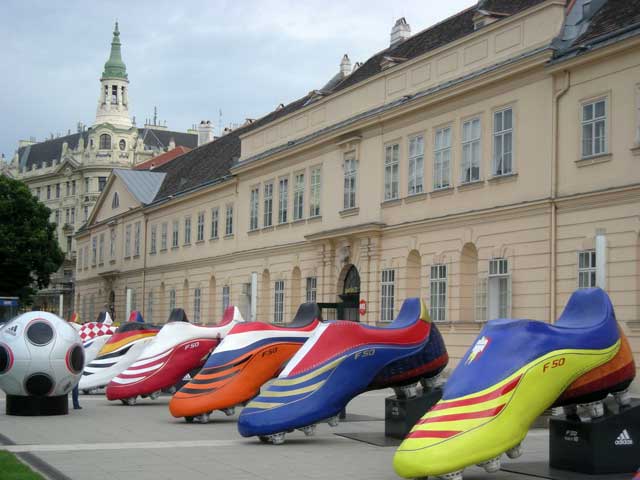Euros
Euro 2008 (Part One)
As the world’s media gathered to learn of the details of the draw for the finals of the 2008 European football Championships in December in Lucerne, the national football association personnel for each of the sixteen finalists intriguingly communicated their responses to the draw in English. This was despite the fact that English was not the first language spoken in any of these countries. This drawn-out UEFA-centred process may have illustrated the linguistic globalisation of the English language; however, it also exposed the failure of all five British/Irish nations to have earned an invitation to partake in the quadrennial event.
Whilst four British teams were represented in the semi-finals of European club competitions this season, the international event that is set to commence only a few weeks following the climax of the domestic and continental seasons was notably lacking in English (native) speaking representation. The Premier League may be the most historic, famous, lucrative and prestigious league in the world, but international football in England is notably failing to keep up with the relentless gravy train known internationally as the EPL.
Of course this has predictably sparked intense dialogue between fans, media personnel and club and association officials about the ‘state of the English game’. Essentially it centres on one underpinning argument: it is a choice between club and country. Everyone has their own opinion and attaches contrasting degrees of worth to their international and club teams. For some, national patriotism will or should always supersede civic pride. Others take a quite different stance, reflecting various often overlapping socio-political identities. Those of the former persuasion usually live in a world where England’s failure to repeat the global success of 1966 is an outcry, and where having never won the European crown is similarly ludicrous. Those who cheer from the latter camp however, are far too concerned with the exploits of their club teams to care about international football. I would suggest that many supporters sit uncomfortably somewhere in the middle. Patriotic they may be, but loyal to their club they will always remain.
So in an era when English club football dominates the continent, its national team has failed to even qualify for Europe's premier competition. In order to explain this development, most people will point to the ‘worrying’ migration patterns that have developed in English football since the Bosman ruling of 1995. Apparently English players do not get the opportunity to break into the first team at most top flight clubs. For such critics, the English league has become a pit for mercenaries who actively seek to demolish the English talent production process, just by accepting a contract with a Premier League club.
The reality is that the failure of Scotland, Wales and Northern Ireland to reach the European Championships is because they are all crap. The Irish and the English however, have the players, but were managed by idiots. If the English league has taught the Football Associations of these two countries nothing else, it should have revealed one simple truth: The most important component in the quest for success is the manager. A good number of terrible footballers have excelled with good management. But how many bad managers win trophies, even with good players? Arsene Wenger turned Igor Stephanovs into a Premier League champion. Rafael Benitez helped Igor Biscan win a European Cup. But no one called Igor should be allowed to even play football. It’s not a footballer’s name is it? Yet, with good management, even an Igor can win a trophy.
England responded to near misses at international tournaments under Bobby Robson in 1990 and Terry Venables in 1996, by employing: Graham Taylor, Glen Hoddle, Kevin Keegan, Sven Goran Erriksson and the legend that is Steve McClaren. The Swede was perhaps an unlucky appointment in many respects. The rest however, were just crap. Whilst the likes of the mighty South Koreans were succeeding well beyond their potential with experienced and successful foreign managers in place, the English FA were quick to appoint Steve McClaren as Eriksson's replacement in 2006, apparently just because he was the best English manager. He won the League Cup with Middlesbrough, before getting destroyed in the final of Europe's secondary competition the following year, which, in the collective opinion of the FA’s executive panel, apparently represented suitable points on the CV.
On paper England have the best international team in Europe, as a starting eleven of James, Cole, Terry, Ferdinand, Richards, Gerrard, Lampard, Hargreaves, Cole, Rooney and Owen would testify. However, they were managed by a man who makes Graham Taylor look like a visionary leader of men. And so, unsurprisingly, they failed. McClaren’s replacement Fabio Capello may well stop the trend of the failing English national team in the 2010 World Cup, but for now, English football fans, must look on in envy, and England’s Football Association employees must look on in embarrassment as Spain, Italy, Portugal and Germany battle it out to win the continent’s premier international prize.
With the absence of the England team and therefore hopefully most of their charming, sophisticated and culturally tolerant supporters, I, along with four lads from the People’s Republic of Liverpool, have decided we can’t resist taking in a few games at the championships in Austria and Switzerland. Of course, thus far we have no tickets, hotels, transport, or even much in the way of an itinerary. But these are minor details in the context of a football excursion. What is to follow in the coming weeks is the story of our adventure. Brace yourselves…
© Soccerphile.com

